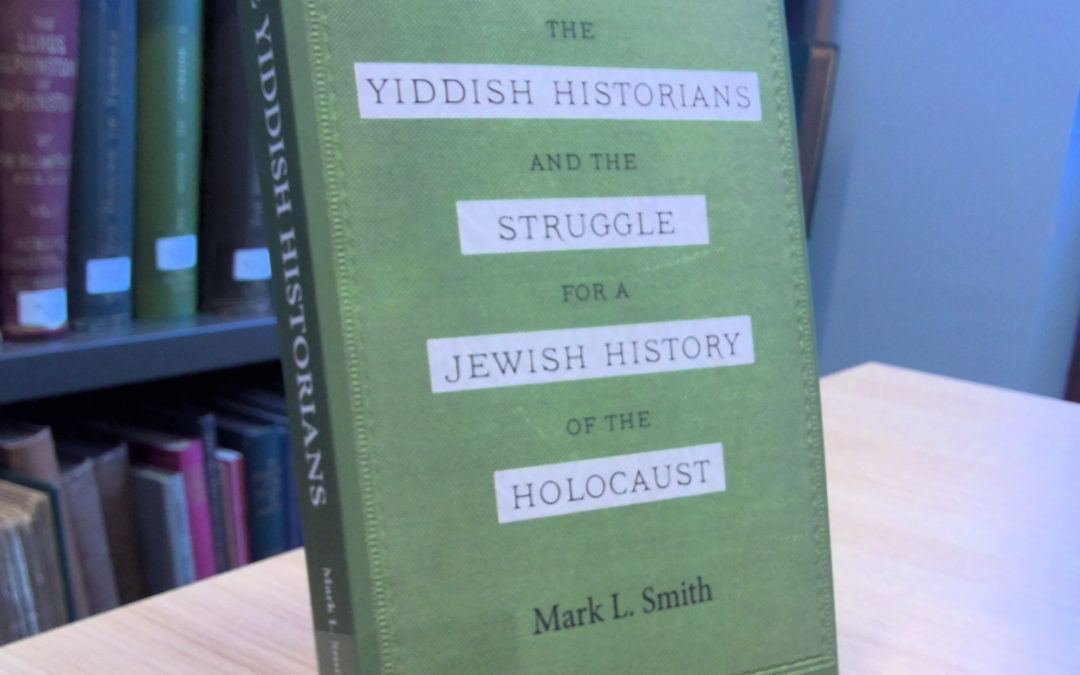This post was written by Alex Kither, Graduate Trainee Library Assistant at the Institute of Historical Research.
February has been another busy month of collection development for the IHR library. Our medieval holdings have been enriched with the addition of the Cambridge History of Medieval Monasticism in the Latin West in two volumes and a beautifully illustrated edition of the Ludlow Castle heraldic roll compiled by the Mortimer History Society. The library has also recently acquired several memoirs including the incredibly timely writings of an NHS nurse working through the Covid-19 crisis and, for comparison, the memoirs of Dr Ross Slotten-one of the earliest doctors to treat AIDS in Chicago. LGBTQ+ history has also been well represented in our February acquisitions, including oral histories, memoirs, archival studies, and a practical guide to searching LGBTQIA historical records.
As is often the case, our acquisitions have been diverse in their range of subject, period, and provenance, however in this short post we will be highlighting four newly acquired books of Jewish history, from the medieval period to the 20th century and spanning from central Europe to the West Coast of America.
Jews and crime in Medieval Europe
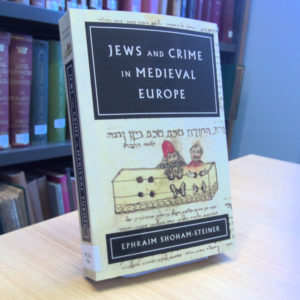 The history of Jewish criminality in Medieval Europe is a topic marred with prejudice on the one hand and apologetics on the other. However, through this monograph, Shoham-Steiner has undertaken a nuanced examination of the involvement of Jewish communities in criminal activity by drawing on a wealth of legal, literature, literary and archival sources. Not only does the author seek to provide insight into how the accused transgressors understood themselves, but also how medieval European society acted towards these communities, and to detail the mechanisms employed by legal bodies to conform Jewish criminals in medieval Europe. The book establishes many of the methodological challenges confronting this subject, not least the scarcity of primary source material, as well as a detailed analysis of the historical evidence, including eleven appendices of historical case studies.
The history of Jewish criminality in Medieval Europe is a topic marred with prejudice on the one hand and apologetics on the other. However, through this monograph, Shoham-Steiner has undertaken a nuanced examination of the involvement of Jewish communities in criminal activity by drawing on a wealth of legal, literature, literary and archival sources. Not only does the author seek to provide insight into how the accused transgressors understood themselves, but also how medieval European society acted towards these communities, and to detail the mechanisms employed by legal bodies to conform Jewish criminals in medieval Europe. The book establishes many of the methodological challenges confronting this subject, not least the scarcity of primary source material, as well as a detailed analysis of the historical evidence, including eleven appendices of historical case studies.
Jewish voices of the California gold rush: a documentary history, 1849-1880
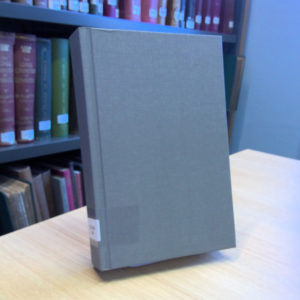 This documentary history of Jewish immigrants to the west coast of America in the latter half of the nineteenth century was published as part of the American Jewish civilization series. It details the various lived experiences of aspiring miners, merchants and entrepreneurs who were drawn to California in search for gold. The book details how immigrant families became founders of their own social, cultural, and religious institutions across the state of California, and marks the significant impact the gold rush had on the development of these communities. This narrative anthology aggregates letters, diaries, memoirs, news articles, court reports, and photographs to create a comprehensive overview of this period as a contribution to the history of Jews in the United States. The text offers a wealth of primary source materials – both public and private documents – and places them within their proper historical context.
This documentary history of Jewish immigrants to the west coast of America in the latter half of the nineteenth century was published as part of the American Jewish civilization series. It details the various lived experiences of aspiring miners, merchants and entrepreneurs who were drawn to California in search for gold. The book details how immigrant families became founders of their own social, cultural, and religious institutions across the state of California, and marks the significant impact the gold rush had on the development of these communities. This narrative anthology aggregates letters, diaries, memoirs, news articles, court reports, and photographs to create a comprehensive overview of this period as a contribution to the history of Jews in the United States. The text offers a wealth of primary source materials – both public and private documents – and places them within their proper historical context.
Unlikely heroes: the place of Holocaust rescuers in research and teaching
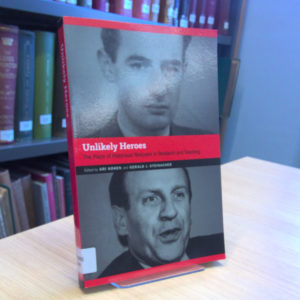 This volume is the result of a collection of papers presented at the Sommerhauser Symposium of Holocaust Education in 2017, and primarily aims to address the urgent need to revaluate academic knowledge and education about Holocaust rescue. This transdisciplinary collection of chapters is structured in two parts: the first focusing on academic research of Holocaust, while the latter half concerns Holocaust education in schools and universities. The primary subject of the book is in the study of the ‘humanitarian hero’, and how historians, politicians and filmmakers have treated individual rescuers in the memory and education of the Holocaust. Additionally, the editors provide an extensive bibliography and filmography, including both documentaries and feature films, organised by category and designed as a practical aid in the Holocaust research.
This volume is the result of a collection of papers presented at the Sommerhauser Symposium of Holocaust Education in 2017, and primarily aims to address the urgent need to revaluate academic knowledge and education about Holocaust rescue. This transdisciplinary collection of chapters is structured in two parts: the first focusing on academic research of Holocaust, while the latter half concerns Holocaust education in schools and universities. The primary subject of the book is in the study of the ‘humanitarian hero’, and how historians, politicians and filmmakers have treated individual rescuers in the memory and education of the Holocaust. Additionally, the editors provide an extensive bibliography and filmography, including both documentaries and feature films, organised by category and designed as a practical aid in the Holocaust research.
The Yiddish historians and the struggle for a Jewish history of the Holocaust
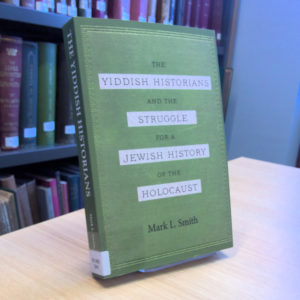 In this historiography of Holocaust studies, the author identifies a distinct approach to writing Holocaust history in the years following the second world war. This approach was epitomised by a community of Yiddish historians who were united under a common research agenda and a commitment to sharing their work with the worldwide community of Yiddish-speaking survivors. The works of these historians is described as focusing deliberately on the study of Jewish life, rather than death, under Nazi occupation and contests the early Holocaust historiography that primarily focused on the ‘perpetrators’ rather than the victims. This book is a unique work which highlights a largely neglected area of historiography and seeks to reintegrate the works of these Yiddish historians into the mainstream of Holocaust study.
In this historiography of Holocaust studies, the author identifies a distinct approach to writing Holocaust history in the years following the second world war. This approach was epitomised by a community of Yiddish historians who were united under a common research agenda and a commitment to sharing their work with the worldwide community of Yiddish-speaking survivors. The works of these historians is described as focusing deliberately on the study of Jewish life, rather than death, under Nazi occupation and contests the early Holocaust historiography that primarily focused on the ‘perpetrators’ rather than the victims. This book is a unique work which highlights a largely neglected area of historiography and seeks to reintegrate the works of these Yiddish historians into the mainstream of Holocaust study.

